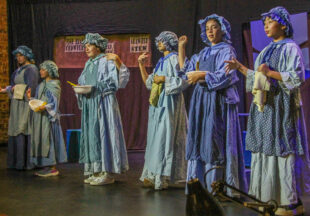State Rep. discusses upholding Article 7: Supporting our public schools

By Glenn Rogers/Texas House of Representatives – District 60
Support for our public education institutions is as old as the State of Texas. Article X of the 1845 Constitution, adopted by the Legislature prior to our admittance into the Union, enshrines the support, diffusion, and maintenance of public schools as a requirement by the state’s Legislature. Thirty-one years later, following the re-admittance of Texas into the United States after the Civil War, the new Texas Constitution reaffirmed the constitutional duty of its Legislature to uphold and provide for public education institutions — this time in Article 7.
Texas has over 30 million residents and 5.5 million public school students in over one thousand school districts educated by 360,000 teachers. For nearly 150 years, Article 7 of the Texas Constitution has stood as a mandate to the Legislature to provide for an effective, well-funded public school system. However, in the past decade, support for public education has declined in popularity in the growing metropolitan areas, and a plethora of special interest groups have capitalized on the opportunity to privatize our school system entirely.
Texas is a bastion of educational liberty. Our state has a robust private, charter, and homeschool network for those who wish to educate their children in an alternative environment; however, the Legislature cannot abandon its duty to the public institutions that provide quality education for millions of young Texans. As we head into the upcoming school year and the 88th Legislative Session, both public entities and the Texas Legislature must work together to better support our public schools and address the lingering concerns from parents, teachers, and administrators alike.
Since the tragedy at Uvalde on May 24, my office has traveled around the district to meet with public and private schools to discuss school security needs in hopes to avoid a one-size-fits-all mandate, forcing districts to adopt solutions that do not work for them. House District 60 is a uniquely diverse area encompassing relatively large suburban schools, such as Aledo and Weatherford, as well as smaller rural schools, like Palo Pinto or Breckenridge. While there are common sense strategies, such as adding a Student Resource Officer or bullet-resistant film, the unique specifications of “school security” can vary by school.
Each ISD takes a similar, but unique, approach to school security and leverages its resources, partnerships, and community to find solutions to keep their children safe. The State of Texas must try to provide districts the funding and flexibility to collaborate with parents, law enforcement, and their own administration to better improve the protection and prevention of another tragedy.
However, while brick-and-mortar defense is at the top of parents’ minds when they think of protecting our schools, prevention of these tragedies is influenced by many other factors that are underrecognized from a top-down view of our education system. Currently, Texas, alongside the rest of the United States, is in the grip of a massive teacher shortage, leaving many of our local ISDs heading into the upcoming academic year understaffed. As a result, some ISDs are turning to paraprofessionals who may not yet have the classroom expertise to manage students’ educational and emotional needs.
Some students are suffering from drastic and long-term mental health effects because of the pandemic, lockdowns, and lack of social interaction. Students need access to qualified mental health professionals and veteran teachers who can provide the secondary support structure or crisis intervention.
In response to the nationwide teacher shortage, Governor Greg Abbott assembled a committee to improve and facilitate teacher recruitment and retention; however, this organization is looking at long-term aspirations, and schools require immediate assistance. To this end, many retired teachers have considered returning to the profession and providing veteran knowledge to their local communities for the upcoming academic year. Retired teachers returning to the classroom has a benefit for all involved, as local ISDs gain quality faculty, and the retirees can supplement their income during historic inflation.
Teachers are often maligned by politicians and activists as a scapegoat for societal woes. Most of our societal woes are due to the destruction of the family unit. Teachers cannot make up for absent parents, though they often help immensely. Our public education system needs our support; local ISDs are continually asked to provide a more significant role in dealing with the emotional and safety needs of students, with varying degrees of financial flexibility. The right to a free, efficient, and fair education is in the interest of all Texans. Our students need a robust education model that allows for them to graduate and be a competitive applicant in the job market or prepared to pursue quality higher education.
Our public schools are the cornerstones of our communities and state. The Legislature has the unique opportunity this session to uphold our constitutional duty and create an environment that motivates educators to teach and nurture students and keep them safe, while defending the right to parental transparency. It must start with a renewed effort to support our teachers and pro-actively address the immediate challenges facing our public schools.































































































